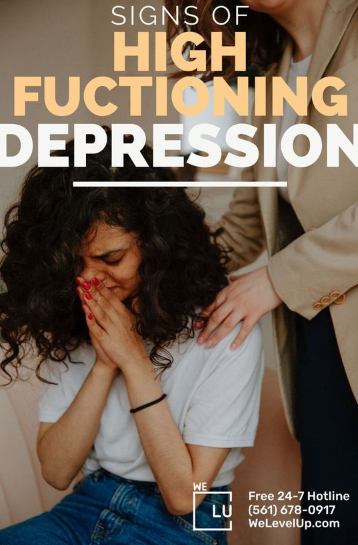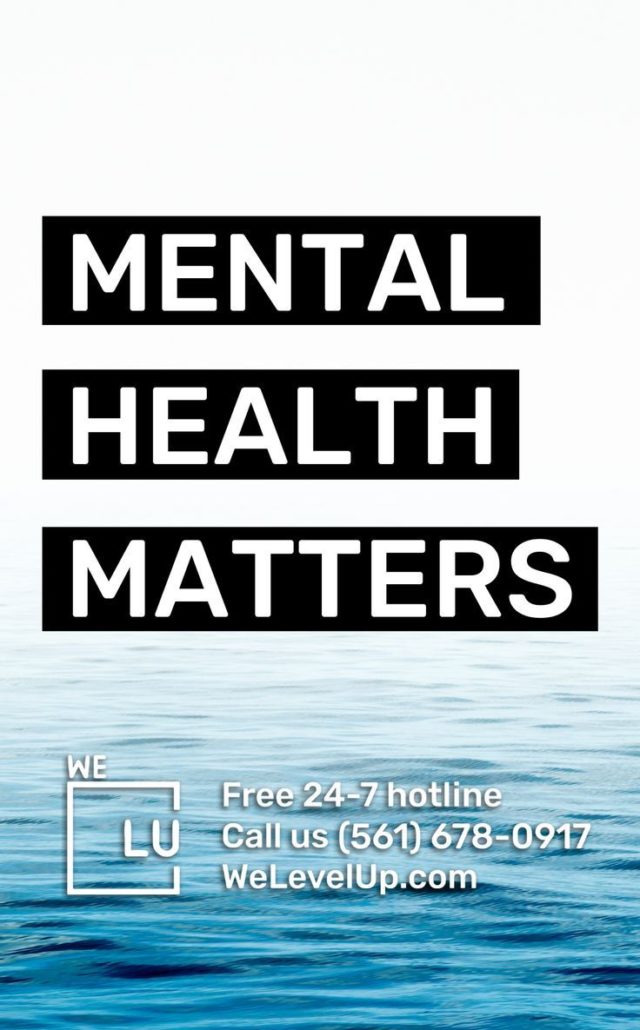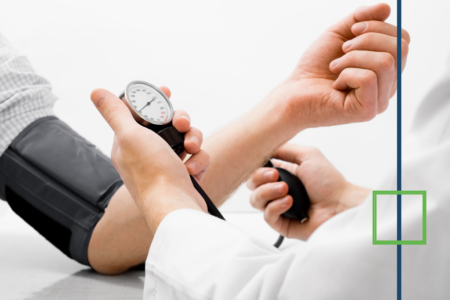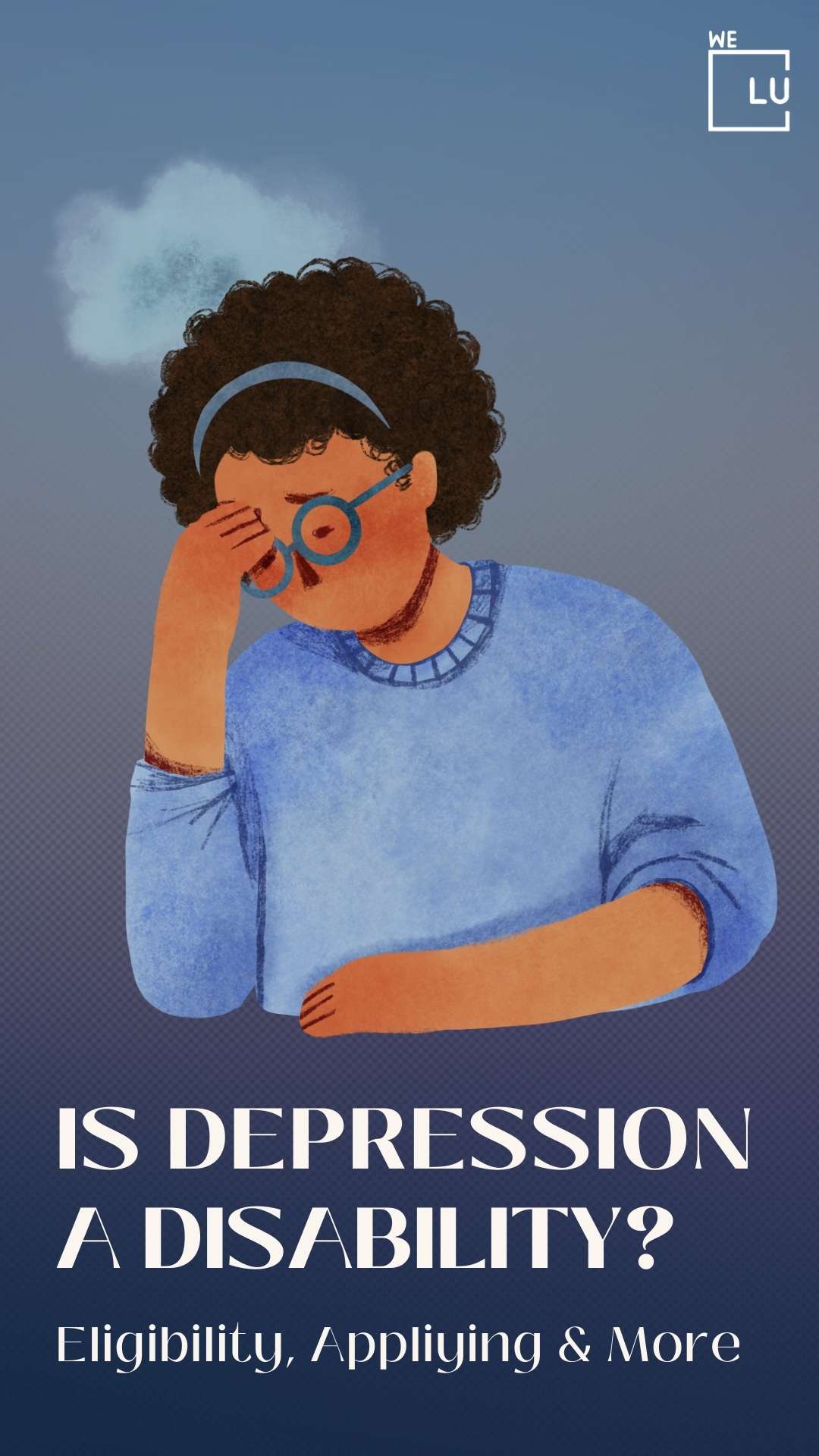By We Level Up FL Treatment Center | Editor Yamilla Francese | Clinically Reviewed By Lauren Barry, LMFT, MCAP, QS, Director of Quality Assurance | Editorial Policy | Research Policy | Last Updated: March 28, 2023
What is High Functioning Depression?
Is high functioning depression real? If I were to ask you to visualize and define a depressed individual, what would you picture? Is it with someone having a problem getting out of the bed regularly? Someone who can’t control crying and who is feeling useless? Or would you picture a popular, college-educated skilled person living in a big city with a prominent job?
According to mental health experts, although high-functioning depression may not like the idea of sadness that most of us have in our thoughts, this diagnosis poses considerable consequences if left untreated. [1] But the uniquely deceptive thing about high functioning depression is that it’s challenging to spot exactly compared with clinical depression because the individuals dealing with it look, from the outside, like they are holding it all together.
This can result in a lack of capacity to self-identify (or have others identify you) as depressed and a probable aversion to mental health care due to the stigma associated with more “normal” sadness. And this is a major issue. But if a depression screener conducts depression screenings with you, they may ask you more detailed questions about your feelings and behaviors.
5 Signs of High Functioning Depression
Whats high functioning depression? It can be hard to explain depression to someone who has never struggled with this mental health condition. Depression is a disorder only comprehended by those who have experienced it themselves.
Individuals have different ways of coping with their depression. Some may use alcohol or drugs to self-medicate, some may turn to food, and some may withdraw or isolate. Some people, however, have what is called “high-functioning” depression. This is a less intense type of depression that is easier to hide from others.
Do I have high functioning depression? Someone struggling with high functioning depressive disorder still experiences many classic signs of clinical depression. However, this form of persistent depression has some unique attributes, including the following:
- The signs and symptoms of depression are less intense than major depressive disorders, therefore appearing more manageable.
- A person can function at work and maintain normal, healthy relationships, despite mild depression.
- For people to be able to hide their true emotions or feelings from loved ones, they may struggle with chronic somatic symptoms, such as headaches and stomach discomfort.
- Someone may self-medicate with a substance, leading to alcohol and drug abuse.
- Even though the individual can achieve daily tasks, everything they tackle takes a huge effort.
Any form of high functioning depression meaning, including high functioning anxiety and depression, is difficult to live with. A treatment regimen involving a combination of antidepressants and psychotherapy, regular exercise, and practicing mindfulness may offer some comfort. Many types of mental health providers treat depression. Your main mental health healthcare provider can help you find the right support and screening tools for depression.
High Functioning Depression Causes
Like all types of depression, functional depression can derive from several causes. A combination of genetic, biological, or life experiences may lead to functional depression.
Stress, illness, unresolved grief, substance abuse, trauma, relationship issues, and major life transitions are a few explanations someone might grow depressed.
There are several causes why someone may develop functional depression. A person with functional depression often has mild enough symptoms to continue functioning. Or they could be perfectionists frightened to show that they are struggling. [2]


Skip To:
Learn More:
Depression Facts
DSM-5 Depression Definition
Depression is a mood disorder described by chronic unhappiness and loss of interest. The (APA) American Psychiatric Association’s (DSM-5) Diagnostic Statistical Manual of Mental Disorders classifies depressive disorders into:
- Disruptive Mood Dysregulation Disorder.
- Major Depressive Disorder.
- Persistent Depressive Disorder (Dysthymia).
- Premenstrual Dysphoric Disorder.
- Depressive Disorder due to another medical condition.
All depressive illnesses share sorrow, emptiness, or irritated mood, as well as physical and cognitive abnormalities that greatly impair the individual’s ability to function.
Because of false perceptions, nearly 60% of people with depression do not seek medical help. Many feel that the stigma of a mental health disorder is unacceptable in society and may hinder personal and professional life. There is good evidence indicating that most antidepressants do work, but the individual response to treatment may vary.
Depression Etiology
Major depressive illness has a complex etiology, with genetic and environmental factors playing a role. First-degree relatives of depressed persons are around three times more likely to acquire depression than the general population; nevertheless, depression can arise in people with no family history of depression.
Depression Epidemiology
Twelve-month prevalence of the major depressive disorder is approximately 7%, with marked differences by age group. The prevalence in 18- to 29-year-old individuals is threefold higher than in individuals aged 60 years or older. Females experience 1.5- to 3-fold higher rates than males beginning in early adolescence. In the US, depression affects nearly 17 million adults, but these numbers are underestimates as many have not even come to medical attention.
Depression Pathophysiology
The underlying pathophysiology of major depressive illness is not well understood. Recent data suggests a complicated relationship between neurotransmitter supply, receptor modulation, and sensitivity causes emotional symptoms.

End the Emotional Pain. Get Your Life Back.
Feeling Depressed, Anxious or Struggling with Mental Health Illness? Get Safe Comfortable Mental Health Dual Diagnosis High-Quality Therapy From Counselors That Care. Begin Your Recovery Now.
Hotline (855) 940-6125Depression Statistics
Depression illness is distinct from normal mood swings and short-term emotional reactivity to daily challenges. High functioning depression and anxiety may be dangerous to one’s health, especially if it occurs frequently and with moderate or severe intensity. It can cause severe pain and impair work, school, and family performance. Depression, at its worst, can lead to suicide. Every year, around 700,000 individuals commit suicide. Suicide is the fourth highest cause of mortality among those aged 15 to 29.
3.8%
Depression is common worldwide, with about 3.8 percent of the population affected, including 5.0 percent among adults and 5.7 percent among adults older than 60.
Source: WHO
280 million
Approximately 280 million people in the world have depression.
Source: WHO
6.7%
Over 6.7% of all Americans will experience at least one major depressive episode yearly. But chronic high-functioning depression only accounts for about 1.5% of Americans.
Source: NIMH
High Functioning Depression Symptoms
1. Problem with experiencing joy.
What is high-functioning depression? With high-functioning depression, the activities that used to thrill you, whether a favorite yoga class or a monthly get-together with your buddies, no longer do. They may appear to be burdens or occurrences you wish to avoid since they need more work than support.
2. Relentless criticality of self and others.
What does high functioning depression look like? You may have an internal portrayal in which you are constantly critical of yourself, others, and the world. You feel you are a failure, your boss is not good, your spouse is the most aggravating person ever, and life is a chore. This destructive mental habit may appear to be uncontrollable.
3. Constant self-doubt.
You may continually wonder if you’re on the correct job path, in the appropriate relationship, what you’re doing with your life, and even if you’re capable of being an adult. This pattern of persistent self-doubt may be temporary or pervasive, but it feels intractable.
4. Diminished energy.
If going through each day feels like climbing a mountain with a backpack full of pebbles, if you feel like you barely have the mental and emotional resources. You no longer have the physical energy to manage your life. If your general energy levels are significantly reduced, this might indicate high functioning depression.
5. Irritability or excessive anger.
Assume you find yourself getting worked up over little matters. If your partner says something wrong, a coworker messed up a project, or your child just broke your favorite coffee mug, you find yourself bursting emotions in a way that feels disproportionate to the occasion. You struggle with irritability and excessive anger, which could be high functioning depression definition.

6. Small things feel like huge things.
Similarly, if you find yourself feeling overwhelmed or greatly stressed by an event that would not have seemed like such a big deal in the past (a friend cancels weekend plans, the grocery bags break while you’re carrying them in, your darn trackpad stops working because you spilled some coffee on it) and it feels like the “end of the world,” it is. If your stress responses are disproportionate to the incident, this might indicate high functioning sadness and anxiety.
7. Feelings of guilt and worry over the past and the future.
You worry that you chose the wrong major in college, that you’re in the wrong graduate program, that you’ll never be able to pay off your student loans, that your biological clock is ticking, that you married the wrong person, that you’ll be unable to care for your parents when they get older, and so on. We all have similar concerns occasionally, but if shame and anxiety about the past and future feel constant and overwhelming, this may be more than a “normal” concern.
8. Relying on your coping strategies more and more.
Find yourself needing extended zone-out time after work and on weekends, frequently turning to your coping methods, such as substances or behaviors such as drinking, substance abuse or utilizing drugs, excessive gaming, nonstop Netflix, and so on, all to escape your reality. This might be a sign of underlying depression.
9. Generalized sadness.
If you discard your mask and armors of smiling competence as you lock your door behind you, you won’t be able to locate the source of your misery. If you have a slight sensation of hopelessness, this might be a sign of high functioning depression.
10. Seeking perfection.
This one is difficult. Perfectionism, such as achieving outstanding marks, getting into Ivy League schools, finding that fantastic tech job, and striving, is tolerated in our culture. Yet, perfectionism has a dark side when striving becomes unrealistic expectations of yourself and mentally punishes yourself when you fall short of the standard you set for yourself. If you find yourself doing this and it bothers you, consider whether it indicates high functional depression.
11. Inability to rest and slow down.
If you need to clean, tidy, and organize the house after a long day at work before you can even think about resting, if you are uncomfortable with slowness, stillness, and fallow periods of time because of the uncomfortable thoughts and feelings you encounter when you do slow down, this could be a sign of highly functioning depression.
Get Help. Get Better. Get Your Life Back.
Searching for Accredited Dual Diagnosis Mental Health Centers Near You?
Even if therapy failed previously, or are in the middle of a difficult crisis, we stand ready to support you. Our trusted behavioral health specialists will not give up on you. When you feel ready or just want someone to speak to about counseling alternatives to change your life call us. Even if we cannot assist you, we will lead you to wherever you can get support. There is no obligation. Call our hotline today.
FREE 24/7 Dual Diagnosis Mental Health Services HotlineBest Jobs for Someone With Anxiety and Depression
Living and thriving with a mental health condition, such as anxiety or depression, might make finding suitable work difficult. You may be concerned about finding a helpful and understanding employer, or you may be worried that the pressures of a particular sector will be “too much” to create a healthy work-life balance, or it may just be challenging to find the proper employment for your abilities and experience, or the best jobs for someone with social anxiety.
We recognize you’re more than your mental illness. A mental health issue will not prevent you from getting the best jobs for someone with depression and anxiety, but everyone requires some assistance occasionally. Therefore we’ve taken the stress out of your job hunt to avoid the worst jobs for someone with social anxiety by compiling a list of the top 5 careers for persons suffering from depression and anxiety.
- Librarian: Working at a library or as a librarian may be a good fit if you want a relaxing, quiet work environment with particular chores. While some full-time librarian professions need a degree, many libraries also employ library technicians/assistants. They assist with book organization, operating the circulation desk, scanning and uploading papers, and assisting clients in finding books and resources. What’s a good job for someone with anxiety? The best starter job for someone with social anxiety can be in libraries. Libraries are a vital element of every community, so you’ll have the satisfaction of a hard day’s work and the knowledge that you’re making a difference in the world.
- Gardener & Landscaper: These occupations might be ideal for persons suffering from depression or anxiety. They allow you to work outside while still allowing you to be active, which is a fantastic combo! Ground maintenance may involve:
- Watering and feeding plants.
- Pruning trees and shrubs.
- Weeding gardens.
- Keeping places clean.
You can work alone or as part of a team, and there is typically flexibility to accommodate your lifestyle or mental health management.
- Data Entry: Data entry is a clerical labor that includes inputting information (such as numbers and names) into computer systems using typing and voice recording procedures. This labor may be done in many businesses, including healthcare, banking, retail, and transportation/logistics. What is a good job for someone with anxiety? The best job for someone with social anxiety is data entry if you’re analytical and enjoy monotonous tasks. This is often an option if working remotely or from home is more convenient. Several careers are available, from internships/to entry-level jobs requiring a degree. Hence, regardless of your ability level, there is something for everyone.
- Courier/Delivery Driver: Consumers are purchasing online more than ever before, so there is a more significant need for delivery drivers! This might involve working for a postal service, a local freight firm, or even starting your own business! What is a good job for someone with social anxiety? The best job for someone with anxiety can be driving. You’ll spend most of your time traveling and won’t have to deal with crowds or customer service. And you can listen to any music you choose, which is always a plus!
- Be your Boss: Sometimes, it isn’t easy to find the proper fit for you, or you want to include the flexibility you need to stay healthy. Becoming your boss is a fantastic choice, and the possibilities are limitless, including:
- Walking the dog.
- Mowing the lawn.
- Administration/Virtual Assistant.
- Cleaning and upkeep of the home.
If you are passionate, consider selling it online through networks like Facebook Marketplace or Etsy!
7 Tips for Managing High-Functioning Depression
Lifestyle changes are frequently beneficial for those suffering from depression. Changes in nutrition, diet, sleep schedule, exercise, substance usage, and engagement in a social support network are examples of lifestyle changes.
While it is normal for people suffering from depression to have trouble establishing new routines, it is advised that you seek the assistance of a mental health professional who will be supportive and assist you in making the most beneficial adjustments. Here are seven lifestyle changes that have been demonstrated to reduce depressive signs for most people:
- Call a psychotherapist as soon as possible to set up an appointment for a high functioning depression test.
- Include exercise in your everyday regimen (as directed by your doctor). Physical activity has been shown to boost mental health and mood in people of all ages. This is especially true for people suffering from chronic moderate depression, such as persistent depressive disorder, and depression caused by chronic anxiety.
- Create daily goals that are straightforward and easy to achieve to increase self-confidence and a sense of success.
- Begin to adopt dietary changes that will result in increased energy, less sluggishness, and better attention.
- Set a routine for sleep and waking.
- Depending on personal health concerns, limit or eliminate alcohol and other narcotics. Get help for substance addiction rehabilitation if necessary.
- Get emotional support from family, friends, or members of your local and online communities.

How To Help Someone Who Has High Functioning Depression?
It might be difficult to know how to assist someone who appears to be depressed. Here are some options to consider the following:
- You may initiate the conversation by asking questions that demonstrate your interest.
- Listen without passing judgment or offering too much advice.
- Avoid clichés and upbeat pep speeches, which may be ineffective.
- Propose to go for a stroll together.
- Make plans for low-pressure social activities that consider the other person’s interests.
Hidden depression can be treated. When patients seek care, their symptoms frequently improve, though the consequences may take some time to become apparent. Medication, psychotherapy, or a combination are the most frequent and successful depression therapies.
If therapy and medicine haven’t completely eased severe symptoms, brain-stimulating therapies may be an alternative. Exercise, better sleep, and a diet low in sugary, processed foods can also help alleviate certain depression symptoms (such as the Mediterranean diet).
It is a question of personal judgment and discretion whether or not to disclose a health issue. While not every family member, friend, or employer is safe and supportive, preserving private health information may be prudent for certain people depending on their circumstances. [3]
Untreated depression raises the risk of suicide. Researchers at the National Institutes of Mental Health imply that untreated depression can also increase your risk of developing diseases, including the following:
- Cardiovascular Disease.
- Diabetes.
- Stroke.
- Osteoporosis.
- Alzheimer’s Disease.
Many individuals find psychotherapy and changes to their diet, exercise, thinking patterns, and sleep habits effective, particularly if symptoms are mild or moderate.
Depression Treatment
Pharmacology alone and brief talk therapy (cognitive-behavioral therapy, interpersonal therapy) can relieve depressive symptoms. Combination treatment has also been correlated with significantly higher rates of progress in depressive symptoms, improvedquality of life, and better treatment adherence. There is also evidence-based support for the ability of cognitive behavioral therapy to prevent relapse depression symptoms. Electroconvulsive therapy benefits patients who are not reacting well to pharmaceuticals or are suicidal.
Medications
- Selective serotonin reuptake inhibitors (SSRIs) have the advantage of lessening the dosing and low toxicity in overdose. These medications are also the first-line medications for late-onset depression.
- Serotonin/norepinephrine reuptake inhibitors (SNRIs) can be used as first-line agents, especially in patients with significant fatigue or pain syndromes associated with episodes of depression.
- Atypical antidepressants are effective in monotherapy for major depressive disorder (MDD) and may be used in combination treatment for more difficult to treat depression.
- Serotonin-dopamine activity modulators (SDAMs) have equal potency as partial agonists at 5-HT1A and dopamine D2 receptors. As a 5-HT2A and noradrenaline antagonist, alp Brexpiprazole is approved as a supplementary treatment for major depressive disorder (MDD).
- Tricyclic antidepressants have a long record of effectiveness in treating depression. These medications are not widely used because of their side effects and considerable toxicity in a drug overdose.
- Monoamine oxidase inhibitors (MAOIs) are widely effective in various affective and anxiety disorders.
First-class Facilities & Amenities
World-class High-Quality Mental Health Services & Behavioral Health Substance Abuse Treatment
Rehab Centers TourRenowned Mental Health Centers. Serene Private Facilities. Inpatient Rehab Programs Vary.
Mental Health Helpline (855) 940-6125Proven recovery success experience, backed by a Team w/ History of:
15+
Years of Unified Experience
100s
5-Star Reviews Across Our Centers
10K
Recovery Successes
- Comprehensive Dual-Diagnosis Treatment
- Complimentary Family & Alumni Programs
- Coaching, Recovery & Development Events
- Comfortable Onsite Medical Detox Center
Cognitive-Behavioral Therapy (CBT)
CBT is a systematic and didactic treatment aimed at assisting clients in identifying and changing dysfunctional thought and behavior patterns (16 to 20 sessions). It is predicated on the assumption that depressed individuals display the “cognitive triad” of depression, which involves a negative view of themselves, the environment, and the future. Individuals suffering from depression also display cognitive distortions that aid in maintaining their negative thoughts. CBT for depression usually incorporates behavioral methods (such as activity scheduling) and cognitive restructuring to shift negative automatic thinking and address maladaptive schemas.
There is proof to support the use of CBT with people of all ages. It is also thought to be effective in preventing relapse. It is especially useful for seniors, who may be more prone to pharmaceutical issues or adverse effects.
Mindfulness-based cognitive therapy (MBCT) was developed to minimize relapse in people who had previously been effectively treated for recurrent major depressive disorder. Mindfulness training is the major therapeutic component. MBCT focuses primarily on ruminative mental processes as a risk factor for relapse. According to research, MBCT successfully lowers the likelihood of relapse in individuals with recurrent depression, particularly those with the most severe remaining symptoms.
Interpersonal Therapy (IPT)
Interpersonal therapy (IPT) is a treatment for a major depressive illness that is time-limited (usually 16 sessions). IPT is based on attachment theory and stresses the importance of interpersonal connections, emphasizing present interpersonal problems. Grief, interpersonal conflicts, role changes, and interpersonal deficiencies are all topics of attention.
Screening Tool for Depression
Many mental health providers treat depression and conduct depression and anxiety screening. Your main healthcare provider can help you find suitable support. The following mental health professionals who have the training to diagnose and treat depression can provide you with resources for depression screening tests and treatment:
- Psychiatrists
- Psychiatrists are licensed medical doctors who specialize in mental health. They can prescribe medication.
- Psychologists
- Psychologists commonly have doctoral degrees, though they do not have medical degrees. Psychologists cannot prescribe medication unless they have a special license. A few psychologists work with providers who can provide prescriptions. Psychologists may use private individual counseling or group therapy sessions.
- Psychiatric or Mental Health Nurses
- They are nurses with special training in different mental health conditions. Nurses who may have a doctoral or master’s degree in psychiatric mental health nursing have advanced practice registered nurses, certified nurse practitioners, and clinical nurse specialists. In the US, some states have particular nurses who can prescribe medications.
- Licensed Clinical Social Workers
- They have at least a master’s degree in social work and a particular mental health internship. They cannot prescribe medication. However, they may work with providers who can provide prescriptions. Providers who are licensed clinical social workers generally have LCSW or LICSW after their names.
- Licensed Professional Counselors
- LPCs are also known as clinicians or therapists. States have various names for these licenses, like LMFT or licensed marriage and family therapist. LPCs generally have a master’s degree in a field correlated to mental health. They cannot prescribe medication but may work with providers who can.
If you are diagnosed with depression, your doctor will review your depression screening scores and treatment choices. Treatment should begin as soon as possible to enrich your chances of recovery. Depression treatment may take time to work, but it can help relieve symptoms and minimize the duration of depression.
Your clinician may recommend that you consult a mental health provider. A mental health provider is a medical professional specializing in depression home screens, diagnosing, and treating mental health issues. If you already visit a mental health professional, a postpartum depression screening or depression test may help direct your care. Remember that mental health professionals can only provide depression screening questions and high functioning depression quizzes for a proper diagnosis.
This brief test will help determine if you may need to see a mental health professional for the diagnosis and treatment of depression. Only a mental health professional can accurately diagnose depression, and if needed, recommend a treatment plan.
*By taking this free quiz, you may obtain your results online and in your email box. You'll have the opportunity to opt-in to learn more about your symptoms, talk to a mental health consultant and join our newsletter. Rest assured your information is private and confidential. Results, consultations and assessment are provided without any cost to you and without any obligation. If you do not wish to provide your contact information, you may omit it during your quiz. Thank you for opting in and participating. To you best of health.
World-class, Accredited, 5-Star Reviewed, Effective Mental Health Dual Diagnosis Programs. Complete Integrated Inpatient Rehab with Free Post Discharge Therapy Planning.
CALL (855) 940-6125End the Emotional Pain Rollercoaster. Gain Stability & Happiness Through Recovery Treatment. Start Mental Health Counseling Today. Get Free No-obligation Guidance by Behaviroal Health Specialists Who Understand Mental Health Recovery.
High Functioning Depression Treatment
While there is no single explanation for why someone develops high function depression, and there is not necessarily a way to avoid it, several evidence-based effective treatment modalities can help you manage and support yourself. [4]
It’s crucial to recognize the symptoms of depression and get depression treatment before things get worse. Untreated depression can lead to other health issues over time.
If you or someone you know is working hard to mask high functioning depression, know that good help is available. With an accredited depression treatment, depression can be managed, and a better quality of life can be mended.
Contact us to speak with one of our mental health treatment specialists. Your call is private and confidential, and there is never any obligation.

Top 5 Screening Depression FAQs
-
What is a depression screening?
A depression screening is also known as a depression test. It’s a standard series of questions that you answer to assist your doctor in determining if you have depression. Depression is a widespread and significant mental health problem.
-
Can you get a maternal depression screening?
A postpartum depression screening is a series of questions you must answer if you have signs and symptoms of postpartum depression. Your doctor uses the test to determine if you have depression due to having a baby.
-
When is the “National Depression Screening Day?”
National Depression Screening Day is held yearly on October 5th. It’s essential for many reasons. First, it can help people make an informed diagnosis.
-
What is the CPT code for depression screening?
CPT code 96127 identifies a patient’s screening within a behavioral assessment for depression.
-
What is USPSTF depression screening?
The U.S. Preventive Services Task Force (USPSTF or Task Force) produces evidence-based suggestions about preventive programs, such as screenings, behavioral counseling, and preventive remedies. Task Force offers are created for primary care professionals by primary care professionals.
Clinical Depression / Depression Symptoms / Signs of Depression / Major Depressive Disorder Help Video
The We Level Up FL mental health treatment center wants to empower you or a loved one. To learn, grow, and share what works for you and others. It’s up to us to break down the stigma of seeking depression screening tools and receiving mental health care for anybody suffering from depression.
Support and understanding from friends and family may also help cope with depression. It might be beneficial to open up to them about how you’re feeling and the difficulties you’re having. Furthermore, identifying activities and people that positively affect your mental health and seeking them out if you feel overwhelmed by depression might be beneficial. Screening for depression by a mental health professional is the best option to get the proper diagnosis and efficient treatment.
“I found that with depression,
one of the most important things you could realize is that you’re not alone.”
— Dwayne Johnson
“You say you’re ‘depressed’; all I see is resilience.
You are allowed to feel messed up and inside out. It doesn’t mean you’re defective; it just means you’re human.” ― David Mitchell, Cloud Atlas
High Functioning Depression Quotes
Experience Transformative Recovery at the We Level Up Treatment Center.
See our authentic success stories. Get inspired. Get the help you deserve.



Start a New Life
Begin with a free call to a behavioral health treatment advisor. Learn more about our dual-diagnosis programs. The We Level Up treatment center network delivers recovery programs that vary by each treatment facility. Call to learn more.
- Personalized Care
- Caring Accountable Staff
- World-class Amenities
- Licensed & Accredited
- Renowned w/ 5-Star Reviews
We’ll Call You
Search We Level Up FL High Functioning Depression Mental Health Topics & Resources
Sources:
[1] Major Depressive Disorder – StatPearls – NCBI Bookshelf (nih.gov)
[2] Depression – PubMed (nih.gov)
[4] We Level Up – Treatment » Mental Health Program
[5] NIMH » Depression (nih.gov)
[7] Mental disorders (who.int)
[8] About Mental Health (cdc.gov)
[9] COMMON MENTAL HEALTH DISORDERS – Common Mental Health Disorders – NCBI Bookshelf (nih.gov)
